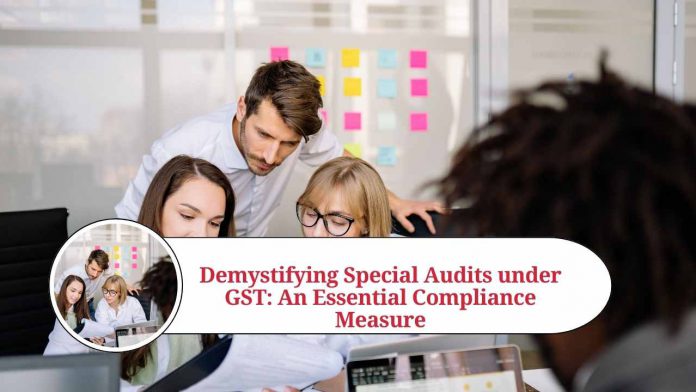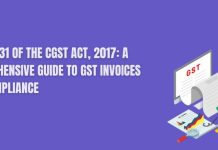To streamline and regulate the taxation system, countries around the world have implemented Goods and Services Tax (GST) regimes. India, too, adopted this transformative tax structure in 2017. GST has undoubtedly simplified taxation processes, but it also calls for stricter compliance and reporting requirements. As part of this, the government has introduced special audits under GST to ensure transparency, accountability, and the prevention of tax evasion. In this blog post, we will delve into the concept of special audits, their purpose, and their significance in the GST framework.
What is a Special Audit under GST?
A special audit is an investigative tool employed by the tax authorities to examine the books of accounts and other financial records of a taxpayer. It goes beyond the regular scrutiny undertaken during routine GST audits. Under Section 66 of the Central Goods and Services Tax (CGST) Act, 2017, the Commissioner or any officer authorized by them may order a special audit if they believe it is necessary to protect revenue interests.
The Purpose of Special Audits: The primary objective of conducting a special audit is to ensure compliance with the provisions of the GST law and to prevent any potential revenue leakage. It helps the tax authorities gain a deeper understanding of the taxpayer’s business operations, transactions, and financial statements. Special audits act as a mechanism to verify the accuracy of tax returns and the payment of appropriate taxes by the taxpayer.
When is a Special Audit Initiated?
A special audit can be initiated under the following circumstances:
- Complexity: The nature of the taxpayer’s business is such that it involves intricate transactions, multiple locations, or a wide range of goods or services, making it difficult to ascertain the correct tax liability.
- Discrepancies: Discrepancies or significant differences are found during the regular audit process, raising concerns about tax compliance or potential evasion.
- Revenue Impact: If there is reason to believe that a substantial amount of tax revenue is at risk due to intentional or unintentional errors in the taxpayer’s records.
- Non-Cooperation: When a taxpayer fails to provide the required information, obstructs the audit process, or intentionally suppresses or manipulates records.
Role and Responsibilities of a Special Auditor: A special auditor, appointed by the Commissioner, plays a vital role in conducting the special audit. Their responsibilities include:
- Detailed Examination: The special auditor examines the books of accounts, records, and other relevant documents to verify the correctness of turnover, input tax credit claimed, and tax liability discharged.
- Report Preparation: Based on the findings of the special audit, the auditor prepares a report highlighting any discrepancies, non-compliance, or potential revenue leakage. The report is submitted to the Commissioner.
- Assistance to Authorities: The special auditor may provide any assistance or clarification required by the tax authorities during the evaluation of the audit report.
Significance of Special Audits under GST: Special audits serve as a mechanism to maintain the integrity of the GST system. They help identify non-compliant taxpayers, prevent tax evasion, and ensure that taxpayers pay their fair share of taxes. The audits act as a deterrent against fraudulent practices, enhancing overall compliance and trust in the tax system. By narrowing the gap between tax liabilities and actual payments, special audits contribute to the government’s efforts to boost revenue collection.
Conclusion
In the realm of GST, special audits play a pivotal role in ensuring compliance, preventing tax evasion, and protecting revenue interests. By conducting a comprehensive examination of a taxpayer’s records, special audits offer tax authorities a deeper insight into business operations and tax compliance. Businesses must recognize the significance of special audits and maintain meticulous records to avoid any potential non-compliance issues.
Read more useful content:
- GST Rules and Regulations in India
- GST Software
- GST Billing Software
- Billing Software
- GST on diamonds
- Making GST Payments
- GST E-invoice
Frequently Ask Question
Q1: What is a special audit under GST?
A special audit under GST is an investigative tool used by tax authorities to examine the books of accounts and financial records of a taxpayer. It goes beyond the regular scrutiny undertaken during routine GST audits and is initiated to protect revenue interests.
Q2: When can a special audit be initiated?
A special audit can be initiated under certain circumstances, such as:
Complexity: If a taxpayer’s business involves intricate transactions, multiple locations, or a wide range of goods or services, making it difficult to ascertain the correct tax liability.
Discrepancies: When significant differences or discrepancies are found during the regular audit process, raising concerns about tax compliance or potential evasion.
Revenue Impact: If there is reason to believe that a substantial amount of tax revenue is at risk due to intentional or unintentional errors in the taxpayer’s records.
Non-Cooperation: When a taxpayer fails to provide the required information, obstructs the audit process, or intentionally suppresses or manipulates records.
Q3: Who can order a special audit?
The Commissioner or any officer authorized by them has the power to order a special audit under Section 66 of the CGST Act, 2017.
Q4: How is a special auditor appointed?
The Commissioner appoints a special auditor to conduct the special audit. The auditor is chosen based on their expertise and qualifications.
Q5: What are the responsibilities of a special auditor?
The responsibilities of a special auditor include:
Detailed Examination: The auditor examines the books of accounts, records, and relevant documents to verify the correctness of turnover, input tax credit claimed, and tax liability discharged.
Report Preparation: Based on the findings of the special audit, the auditor prepares a report highlighting any discrepancies, non-compliance, or potential revenue leakage.
Assistance to Authorities: The special auditor may provide any assistance or clarification required by the tax authorities during the evaluation of the audit report.
Q6: What happens after the special audit is conducted?
After the special audit is conducted, the special auditor submits a report to the Commissioner. The tax authorities review the report and take appropriate action based on its findings. This may include further investigation, assessment of additional tax liabilities, or any necessary penalties or fines.
Q7: Can a taxpayer challenge the findings of a special audit?
Yes, a taxpayer has the right to challenge the findings of a special audit if they believe there are errors or discrepancies. They can present their case and provide supporting evidence to dispute the audit findings.
Q8: How long does a special audit typically take?
The duration of a special audit can vary depending on the complexity of the taxpayer’s business and the volume of records to be examined. It is generally completed within a reasonable timeframe, as determined by the Commissioner.
Q9: How can businesses prepare for a special audit?
To prepare for a special audit, businesses should maintain accurate and up-to-date records of their transactions, ensure compliance with GST regulations, and be ready to provide any requested information to the special auditor. It is essential to have a systematic accounting system in place and retain relevant documents for the prescribed period.
Q10: Are there any penalties for non-compliance with a special audit?
If a taxpayer fails to comply with a special audit order, obstructs the audit process, or intentionally suppresses or manipulates records, the tax authorities can impose penalties, fines, or take other appropriate legal actions as prescribed under the GST law. Taxpayers must cooperate and comply with the special audit process to avoid potential consequences.




















